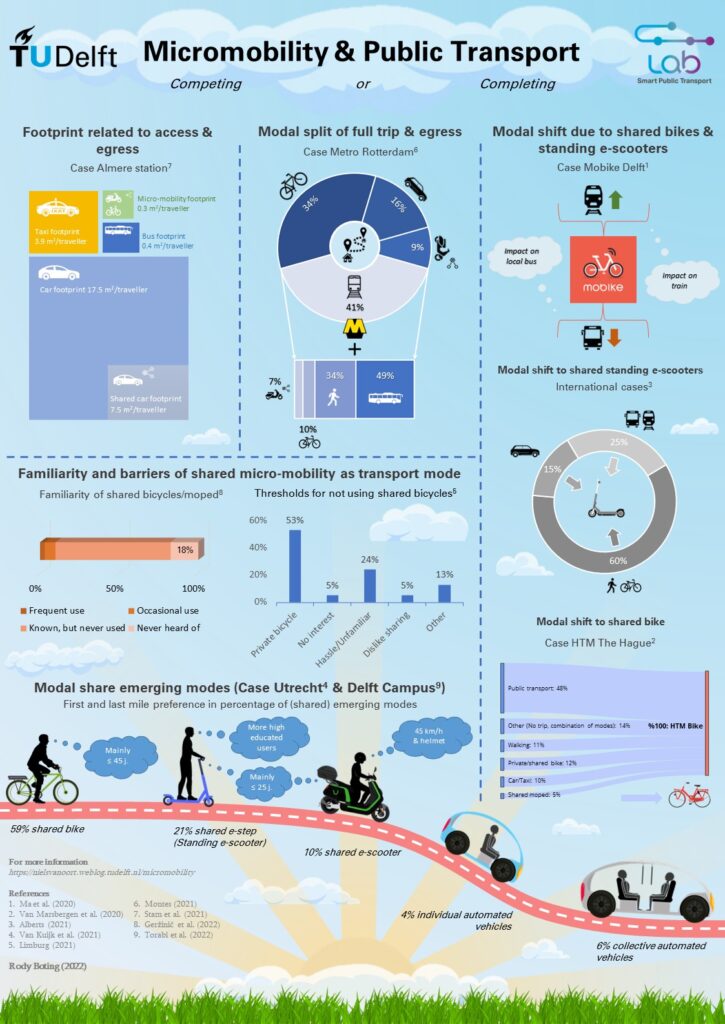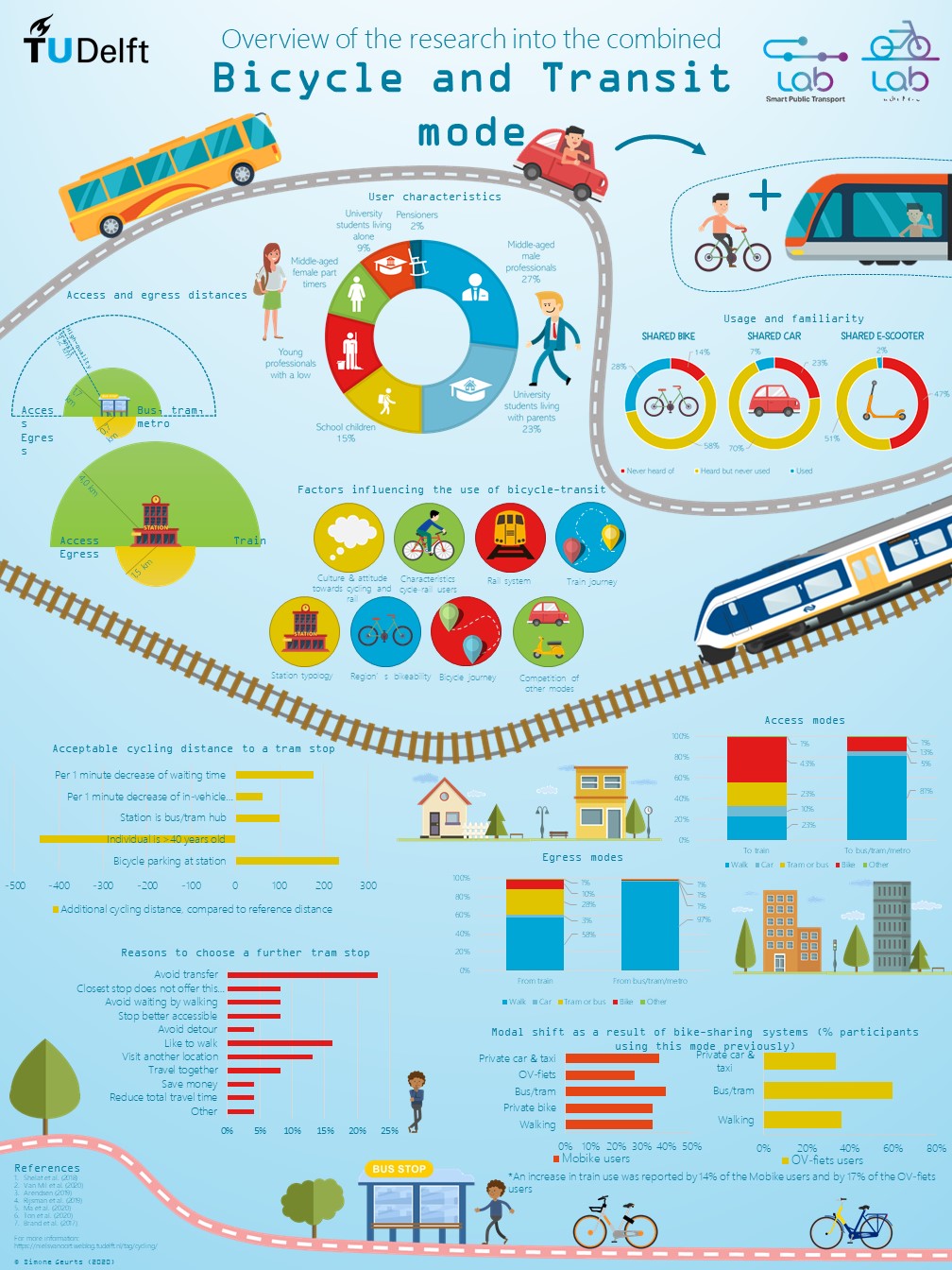Posts tagged cycling
MT-ITS conference: Identifying potential use of emerging neighbourhood mobility hubs using behavioural modelling
Neighbourhood mobility hubs may play an important role in mitigating the impact of passenger cars on climate change and urban public space. As a relatively new concept, academic research on the user potential of neighbourhood mobility hubs is so far limited. This research aims to identify which user groups are likely to adopt services offered by a neighbourhood mobility hub. A survey was distributed in the Netherlands (N=298) and an Exploratory Factor Analysis (EFA) and a Latent Class Cluster Analysis (LCCA) were executed. Four distinctive groups of intended users were uncovered. Two of the clusters have intentions to use neighbourhood mobility hubs. The other two identified clusters do not (yet) intend to use neighbourhood mobility hubs. The clusters indicate that people who currently already travel more by sustainable modes (train or (e-)bicycle) are more likely to be adopters of neighbourhood mobility hubs than the traditional car users. In practice, this may make the positive effect of hubs more limited than anticipated or even increase car use. However it could also facilitate those travelling sustainable to do so for longer as additional shared modes become available to them via hubs. Limitations and directions for further research are discussed.
Read the paper of Van der Meer et al. (2023) HERE
Find the presentation of MT-ITS (2023) in Nice HERE
The full research report is available HERE
More insights into mobility hubs and shared mobility:
Micromobility and public transport
Following technological and societal developments, new modes and services arrive in our cities. Micromobility solutions, such as shared (e-)bikes and –scooters, are adding new opportunities for individuals, but what their (potential) contribution is to societal objectives such as sustainability, land use and inclusiveness, is not yet known. In order to gain this knowledge and optimize the mobility mix, the Smart Public Transport Lab investigates the demand and supply impacts and interaction of micromobility, including the interaction with public transport. In this infographic the main, recent results of the ongoing research are summarized.

Find more results and details in the related papers and theses:
1. Ma et al. (2020): Bike-sharing systems’ impact on modal shift: A case study in Delft, the Netherlands
2. Van Marsbergen et al. (2022): Exploring the role of bicycle sharing programs in relation to urban transit
3. Alberts (2021): Standing e-scooters, what to expect: micro-mobility with micro effects?
4. Van Kuijk et al. (2022): Preferences for shared modes of local public transport users in the last mile
5. Limburg (2021): Potential for sustainable mode usage amongst car users in mid-sized cities
6. Montes et al. (2023): Studying mode choice in multimodal networks including shared modes
7. Stam et al. (2021): Travellers’ preferences towards existing and emerging means of first/last mile transport: a case study for the Almere centrum railway station in the Netherlands
8. Geržinič et al. (2022): Potential of on-demand services for urban travel
9. Torabi et al. (2022): Passengers preferences for using emerging modes as first/last mile transport to and from a multimodal hub case study Delft Campus railway station
European Transport Conference 2022, Milano
The European Transport Conference (ETC) is taking place this week, September 7-9 2022 in Milano, Italy.
The following Smart PT Lab contributions will be presented:
Change in train travelling behaviour during and after Covid-19 due to anxiety (Presentation and research report)
G.B. Hafsteinsdottir, R. van der Knaap, N. van Oort, M. de Bruyn, M. van Hagen.
Shared micromobility and public transport integration. A mode choice study using stated
preference data (Presentation and research report)
A. Montes Rojas, N. Geržinic, W. Veeneman, N. van Oort, S. Hoogendoorn,.
Understanding the whole station choice concept by cyclists (Presentation and research report)
A Barneveld, R Huisman, N. van Oort.
The full program can be found here:
Podcast Mobility Innovators: Human-centered design for Smart Public Transport
Technology and New mobility are reshaping urban transportation in cities. Human-centric design is key to the quality of life in cities, putting people at the heart of urban transport planning. All stakeholders, including academia, will play a key role to reshape the future of mobility.
Listen to the podcast of Mobility Innovators with Niels van Oort:
04:00 Service reliability in public transport
07:40 About Smart Public Transport Lab at Delft University
14:00 How to run LRT system in the cities efficiently
20:20 Digital Inequality in Transport Services
28:50 Tesla predication on Self Driving Vehicles
34:50 MaaS from the passengers’ perspective
38:30 First & Last miles connectivity
44:54 Use of Big Data to improve services
49:05 Role of academia in the new world
Find more details about the discussed topics here:
Digital inequality (literature review paper)
Service reliability (podcast and papers)
5E model of wider impacts of public transport (book chapter 6, page 112-)
‘Hubs, van belofte naar werkelijkheid’
Zijn hubs dé toekomst in de mobiliteit? Is het wel echt zo’n slimme oplossing zoals we de laatste tijd vaak horen, of is het eigenlijk alleen maar een hype? Hierover schreven Iris van Gerrevink, Roderick Tingen, Kees van Son (AT Osborne) en Niels van Oort (TU Delft) recent een artikel voor VNG Magazine en een vierdelige blogserie. Iedere blog focust op een ander type hub en geeft aanbevelingen aan beleidsmakers over hoe ze kunnen werken aan het waarmaken van de beloftes:
Artikel in VNG Magazine: “De Hubtopie”
Deel 1 door Iris van Gerrevink: Komt de hub in de buurt?
Deel 2 door Roderick Tingen: De boer op met de hub
Deel 3 door Kees van Son: De logistieke hub tegen een lading met lucht
Deel 4 door Niels van Oort: Google wat is een hub?
Insights into the bicycle-train combination: welcome on board!
The bicycle as an access and egress mode to and from train stations offers multiple (societal) benefits. A recent study shows that > 60% of the Dutch population who use the combined mode, actually do have the availability of a car, but experience more benefits by using the bicycle+train combination. International studies show that the introduction of shared bicycle systems enabled a shift from car up to 20%. A strong relation with public transport was recommended.
Next to the benefits for the passenger, societal benefits are also widely, namely regarding accessibility, health, safety and sustainability. To conclude, good access and egress facilities also enable to improve the efficiency and quality of public transport networks.
However, good implementation requires attention to up to 40 factors, ranging to safe cycling routes, user characteristics and related preferences and quality of public transport and competing modes. To learn about these and overcome the barriers, we discuss multiple aspects of the combination in detail.
Find the presentation at the European Transport Conference HERE
Find our blog HERE
The future of public transport in the era of emerging modes
Due to societal and technological trends and developments, new modes (will) emerge. In this workshop at the Urbanism Next Europe conference, Maaike Snelder (TNO/TU Delft), Maria Alonso-Gonzalez (KiM) and Niels van Oort (TUDelft) shared their research findings about on-demand pooled services, autonomous shuttles and share bicycles and discussed about their contribution to the future of public transport.
Find the presentations, including references, here:
Workshop Future of Public Transport @Forum ISTS
Due to societal and technological trends, our mobility system and patterns might change. New modes are entering (and leaving) the market, while conventional modes are improved. In this workshop we looked to the future of public transport from the perspective of authorities and operators. The city of The Hague and the Dutch railways (NS) shared their visions on the public transport of the future.
Find the general workshop presentation HERE
Find the presentation of Emile Jutten (City of The Hague) on the national and regional vision on public transport HERE and an animation of the vision HERE
Find the presentation of Mark Oldenziel (NS) on the short term innovations and plans of the railways HERE and an animation of the vision HERE
Travellers’ preferences towards existing and emerging means of access/egress transport
This research elaborates on access/egress transport in further detail and aims to provide insights in the preferences of travellers for existing and new means of access/egress transport such as shared vehicles and on-demand ride services. In this research, a stated preference experiment was performed with Dutch train travellers. In addition to the modal preferences, the expected impacts on land use near train station were assessed.
Find the ETC presentation of Bas Stam HERE
Overview Bicycle+Transit research

Download the poster HERE
References:
Shelat et al.(2018), Characteristics bicycle and transit users
Van Mil et al.(2020), Factors affecting the bicycle and transit mode
Arendsen et al. (2019), Shared mobility for the first and last mile
Rijsman et al. (2019), Walking and bicycle catchment areas of tram stops: factors and insights
